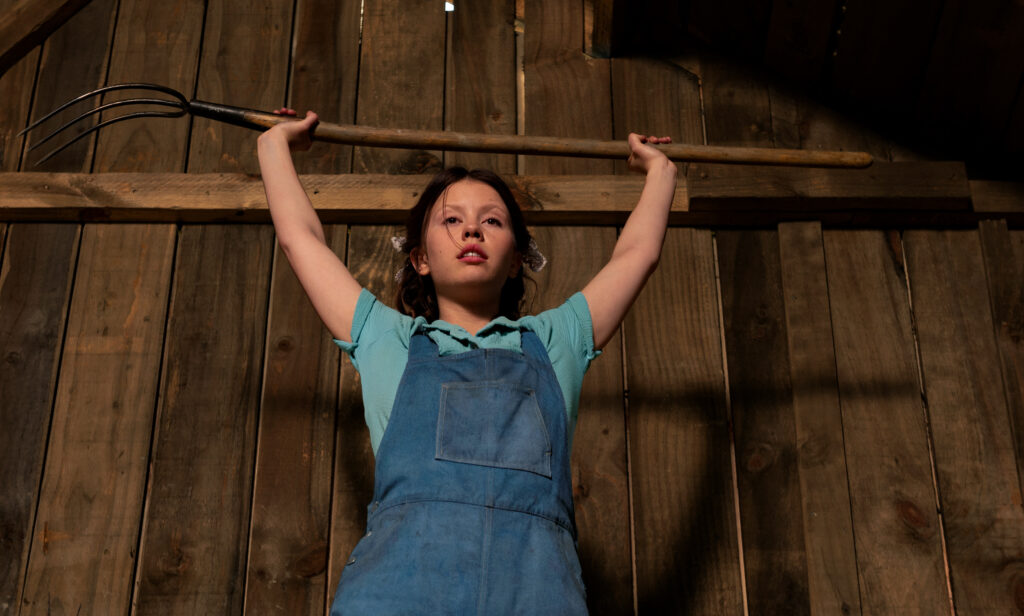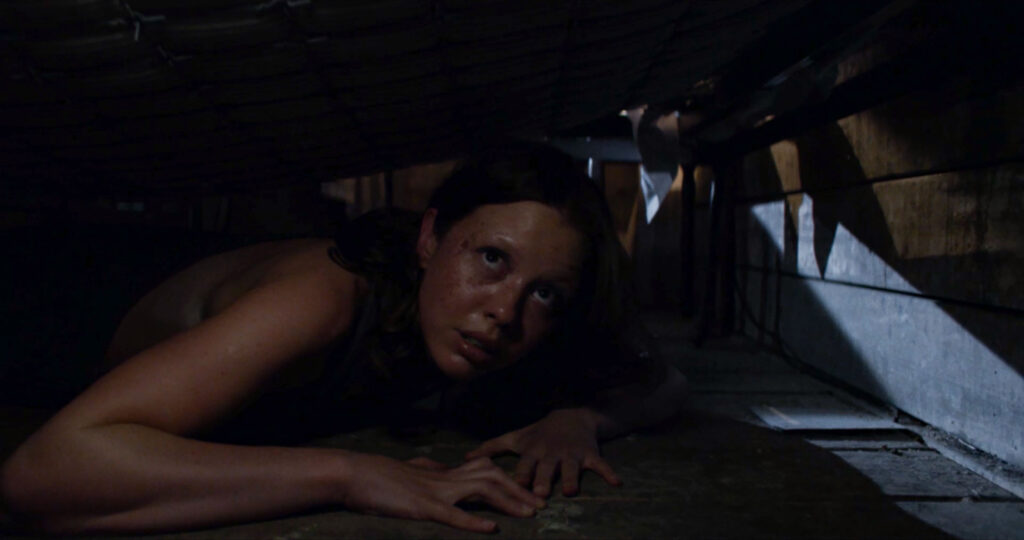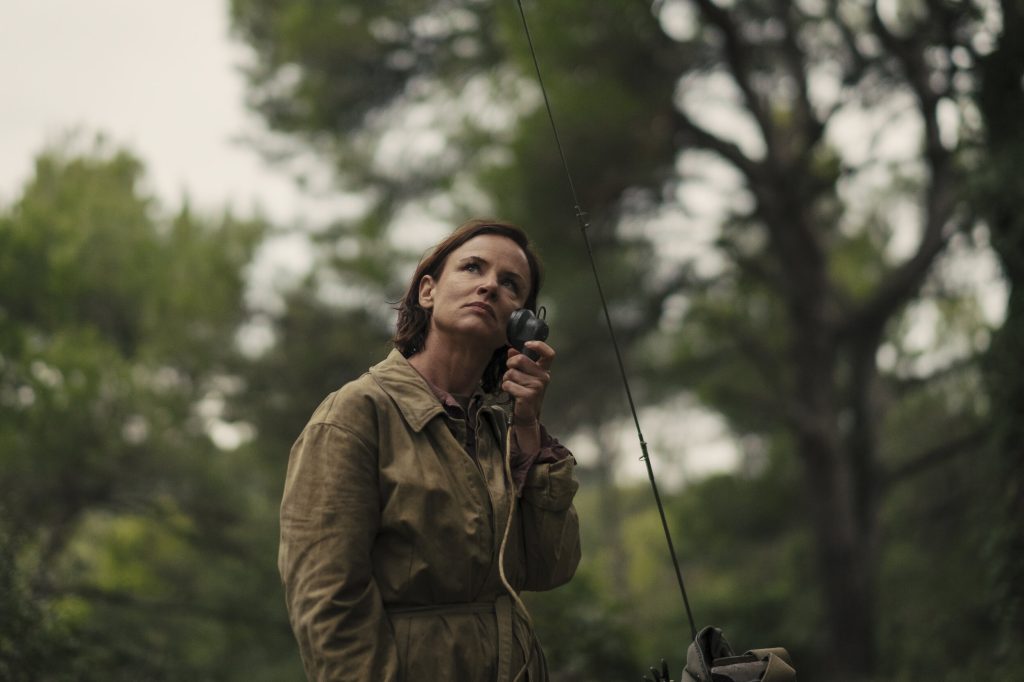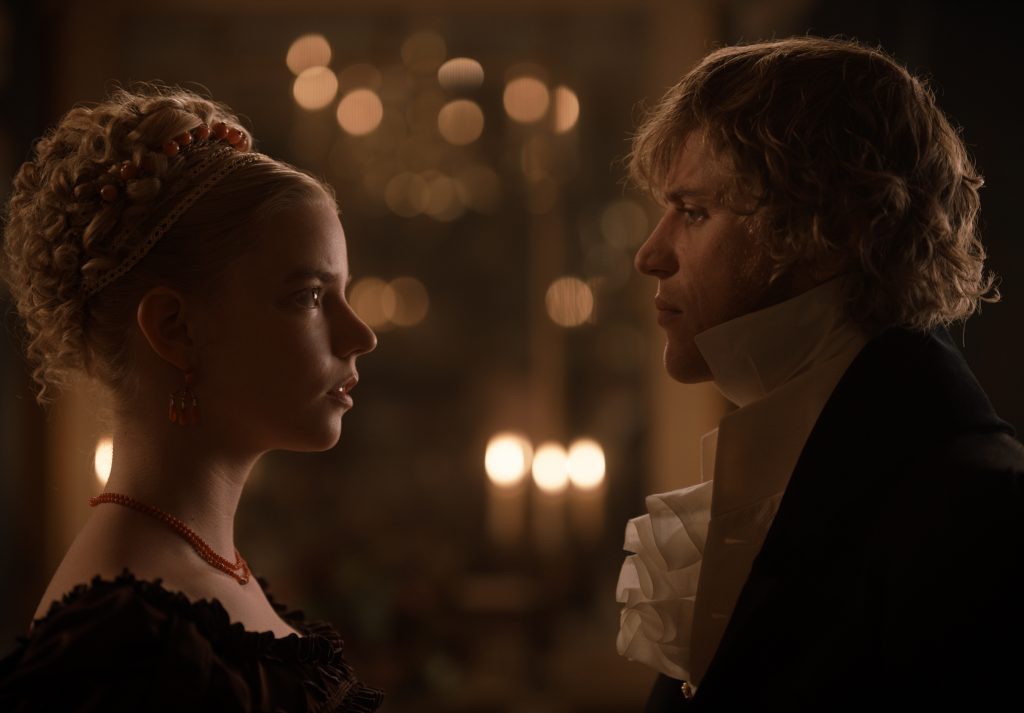January 27, 2023
by Carla Hay
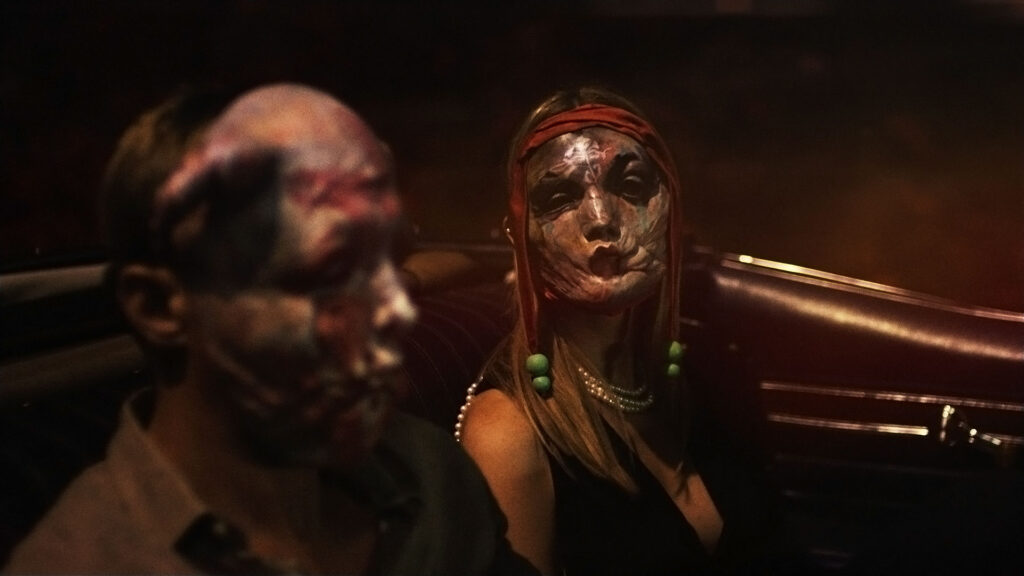
Directed by Brandon Cronenberg
Culture Representation: Taking place in an unnamed European country, the horror film “Infinity Pool” features a predominantly white cast of characters (with a few black people) representing the working-class, middle-class and wealthy.
Culture Clash: While on vacation at a luxury resort, a frustrated author is arrested for being the driver in a hit-and-run accident, and he is offered the high-priced option to avoid execution by having a body double created to be executed instead.
Culture Audience: “Infinity Pool” will appeal primarily to people who are have a tolerance for watching grotesque body horror and dark observations about abuse of privilege and power in human cruelty.

With disturbing visual images and loathsome characters, “Infinity Pool” will disgust and divide some viewers. This horror movie’s performances deliver the intended discomfort in the often-satirical social commentary about how people can become sadists. It’s a story that is definitely not for sensitive viewers, because “Infinity Pool” gets very bloody, dark, and weird. “Infinity Pool” had its world premiere at the 2023 Sundance Film Festival.
Written and directed by Brandon Cronenberg, “Infinity Pool” begins in what appears to be an idyllic location: a luxury resort in an unnamed European country. (“Infinity Pool” was actually filmed in Šibenik, Croatia, and in Budapest, Hungary.) The resort is near a beach and has all the comforts that people can expect from this elite getaway location. Two of the people on this resort will find their dream vacation turn into a nightmare.
James Foster (played by Alexander Skarsgård) is an American author with writer’s block. He’s on this vacation to get inspiration for his second novel. His first novel, “The Variable Chic,” was published six years ago and was a modest seller. James is starting to feel like he’s a fraud for not being able to start his second book.
James is on this vacation with his cynical and snobby British wife Em Foster (played by Cleopatra Coleman), who seems to be alternately irritated by or bored with James. It’s mentioned later in the movie that James and Em have been together for 10 years. At one point in the movie, Em says that she married James because she has “daddy issues” with her father, who did not approve of this marriage.
Em says she despises her father Alvin, a wealthy book publisher who warned her not to marry a financially poor writer. “So I married the first broke writer who spilled coffee on me,” Em says about James. However, Em now openly resents that James is living off her wealth without making any money of his own. She comments sarcastically, “I’m in danger of becoming a charitable organization at this point.”
Em makes these comments to another vacationing couple that James and Em have met at the same resort. Gabi Bauer (played by Mia Goth) and Alban Bauer (played by Jalil Lespert) are seemingly cheerful spouses who are outgoing and fun-loving. Gabi and Alban both live in Los Angeles. Gabi is an actress who’s originally from London, while Alban is originally from Switzerland, and he previously lived in Paris.
Gabi invites Em and James to have dinner with Gabi and Alban. Em is somewhat wary of Gabi being so enthusiastically quick to befriend them. Gabi is more than friendly to James, because when they’re alone together in a private area on the beach, she sexually pleasures him with her hands, without saying a word.
Soon after the two couples meet each other, they’re going on double dates in the evening—first at a restaurant, and later at a nightclub. One night after partying together at a nightclub, Alban is too drunk to drive the rental car that the four of them took to the nightclub, so James offers to drive instead. Everyone is in good spirits on this drive back to the resort.
But on this deserted road, James accidentally hits a man, who appears suddenly in front of the car. The man is killed instantly. James, who is understandably very distraught, wants to get help and let the authorities know that it was an accident. However, Gabi insists that they leave the body on the road and not tell anyone else. She warns James that he does not want to end up in jail in this country. James reluctantly goes along with the plan.
However, James does get caught. He knows it when police officers show up at the door of his resort suite, and they take James and Em into custody. The spouses are separated at the police station and interrogated in different rooms. The lead investigator Detective Thresh (played by Thomas Kretschmann) tells James that Em confessed everything. And the punishment for this crime is execution.
Detective Thresh also says that the dead man is a local farmer named Myro Myron, who comes from a family with a religion that states his death can be avenged by his eldest son. In other words, the son will be the one who gets to kill James. However, Detective Thresh says there’s one way for James to get out of this execution: For a hefty price (which is never detailed in the movie), the authorities in this country can create a body double of James. This body double will be executed instead, but James is required to watch this execution.
The trailer for “Infinity Pool” already reveals that James takes the option of the body double to be executed. However, this decision takes him down a very twisted path of blood lust and violence that is easy to predict but no less horrifying to watch. Each time a body double is executed, the body double is cremated, and the body double’s original person is given the ashes in an urn.
As already revealed in the trailer, Gabi becomes an instigator and manipulator for much of the chaos that happens to James and Em. Gabi and Alban soon introduce James and Em to two other couples at the resort who are part of their hedonistic social circle: Charles (played by Jeffrey Rickets) and Jennifer (played by Amanda Brugel) and Dr. Bob Modan (played by John Ralston) and Bex (played by Caroline Boulton), who all blur the lines between pleasure and pain, and they don’t seem to have any boundaries for either.
“Infinity Pool” goes exactly where you think it’s going to go, with psychedelic drug-fueled sex orgies and gruesomely violent scenes. The violence escalates as a way of showing how James’ moral compass is tested and how he is psychologically affected by the increasingly unhinged actions of the group. Where is Em during all of this madness? The movie shows what happens to her, but it might not be what some people might assume in a horror movie.
Does James try to escape? Of course he does. It’s enough to say that Goth (who gave stellar performances in the 2022 horror films “X” and its prequel “Pearl”) steals the show again with another maniacal and murderous character. Gabi isn’t as interesting as Goth’s characters in “X” or “Pearl” (and 2023’s “MaXXXine,” which is a sequel to “X”), but she’s the type of character in a horror movie that viewers know that what she will say or do next is going to make someone else’s life hell.
“Infinity Pool” is a grotesque display of the cruelty that rich people can inflict on others, just because they can afford to do it and can afford to get away with it. The movie has some twists that aren’t too surprising, but they still provide some shock value to viewers who won’t see these twists coming. “Infinity Pool” is a bacchanalia of horror that isn’t subtle in delivering its message about the abuse of power and privilege, but it certainly makes an unforgettable impression for people who can tolerate this type of unnerving movie.
Neon and Topic Studios released “Infinity Pool” in U.S. cinemas on January 27, 2023.

